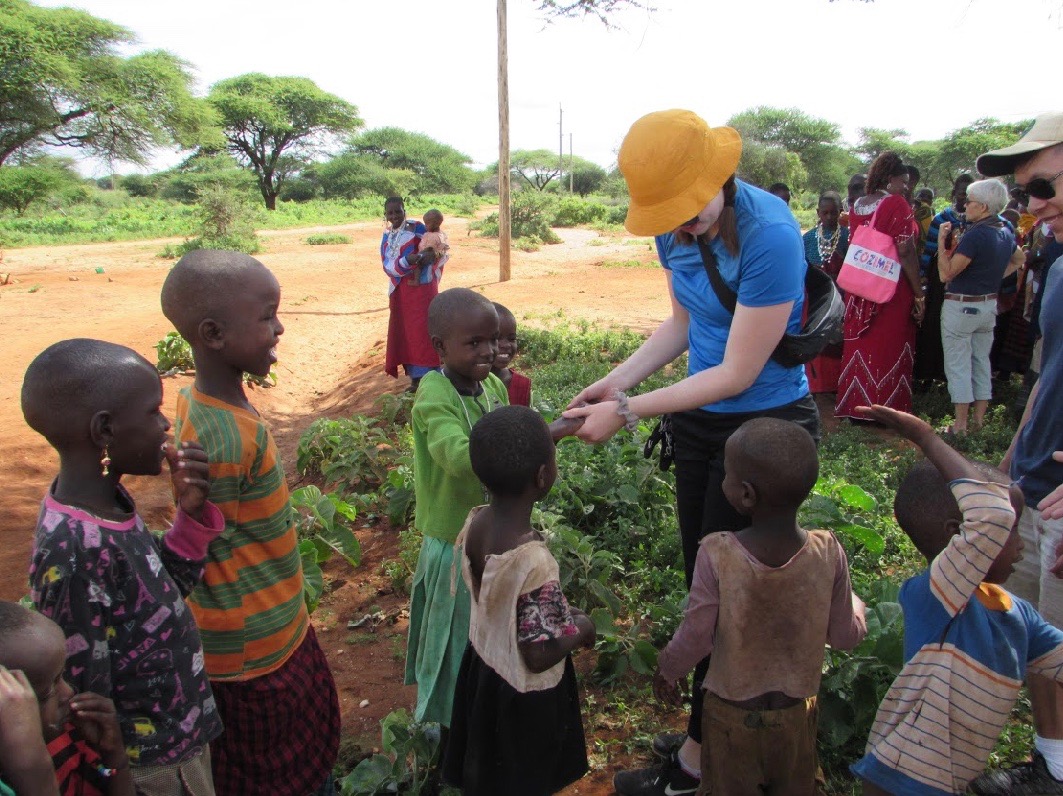From Buckets to Rain Barrels: An extraordinary experience; an extraordinary impact
It started with a conversation, then a one-off trip to Tanzania and now, six years later, From Buckets to Rain Barrels is not only still going strong but is growing and increasing its impact.
From Buckets to Rain Barrels teams Sprott School of Business undergraduate students with peers from Carleton University’s School of Industrial Design to work on solutions to a range of community sustainability issues faced by the Maasai in Tanzania’s Longido district.
To participate, students in Sprott’s Bachelor of Commerce and Bachelor of International Business programs enrolled in a half-credit course, then last year students gained two separate half-credits for their involvement, and come fall, it will be carried out through a full-year, one credit course – BUSI 4117: Developing Creative Thinking.
The industrial design students choose the issue they would like to tackle and spend the first semester of the course working on a solution and developing a prototype for it. While the business students put their skills towards an array of tasks, including but not limited to, developing a business plan, fundraising, pitching their work, costing production and deciding how they will address any resistance to change from the Maasai community members.
“Whatever they design has to be low cost, it has to be able to be built with no special skills on site there and all components have to be able to be sourced there,” explains Troy Anderson, director Sprott Centre for African Research and Business, instructor and founder of this initiative.

During the break between the fall and winter terms, the students travel to Tanzania and present their product to the communities.
“I never thought I would be nervous for a presentation, school ones never really phased me, until I was presenting something that I had spent the last four months assisting my partner in designing,” Kennedy Lichti, a fourth-year Bachelor of Commerce student, says. “We were able to meet with a group of women and garner their feedback on the project.”
“They really liked it which was a huge relief but also had some really good feedback and constructive criticism regarding things we never would have considered to be a factor.”
Once back in Ottawa, they spend the winter term reworking their prototype.
“It was such an amazing experience,” Clarissa Garcia, a recent Bachelor of International Business graduate, says. “I’ve lived abroad before, but being fully immersed in such a different culture, and seeing the way everyone lived in Longido was something that you have to experience to understand that we truly have a lot and take things for granted sometimes.”
Looking back, From Buckets to Rain Barrels started in 2014 when Troy developed this course and decided to help tackle the water issues facing the Maasai in Tanzania. The Longido region experiences periods of extreme drought and water sources are usually far away from the villages. The process of travelling back and forth can often take all day. And, because this duty falls to the women and girls, they end up missing school and falling behind in their education. Given all of this, Troy wanted to help find solutions which could provide communities with sustainable access to clean water – and collaborated with the schools of Industrial Design and Engineering to organize the inaugural trip.
“It went really well so we just kept doing it.”
“This project doesn’t really fall into the hard skills or soft skills categories, which are talked about when people mention employability. But it’s something that changes them,” Troy says. “Students see things that are difficult to see. They see extreme poverty, hardship, they see the unfairness of life. And, they have to deal with it. Most of them do. And, when they do – they change. Something positive happens. It expands them as a person and to me that’s what university is about.”
For many students, the experience has made a transformative impact. Over the years, four Sprott students who took part in From Buckets to Rain Barrels went on to complete the prestigious International Youth Fellowship through the Aga Khan Foundation after graduation.

For Kennedy this experience was “out of this world amazing”.
“It has definitely had an impact on what I value in life and will continue to past this degree.”
While Allison Lee, a third-year Bachelor of Commerce student, says “it was life-changing in a way that I was able to grow by getting out of my comfort zone while making a positive impact in the local communities with a group of peers.”
Given the impact of From Buckets to Rain Barrels, the course has grown to include three more social impact projects. The first, Courts for Change, has students working with varsity student-athletes and students from Industrial Design to design and build sport and recreation facilities in Longido, while also making and providing coaching and wellness programs there. In Northern Lights, students will be paired with peers from either Industrial Design or Neuroscience and will collaborate with clients from Canada’s northern communities to work on current problems facing them. And, the newest project will address the problem of food insecurity in Ottawa. Sprott students will team up with students from Carleton’s Food Science program, and then will work directly with the community to identify and tackle issues which are causing food insecurity within communities in the city.
Students who are interested in taking part in one of these exciting projects, and who have at least third-year standing, can apply to BUSI 4117: Developing Creative Thinking on the Sprott website. Applications are now open at https://sprott.carleton.ca/students/undergraduate/registration/busi-4117-developing-creative-thinking/.